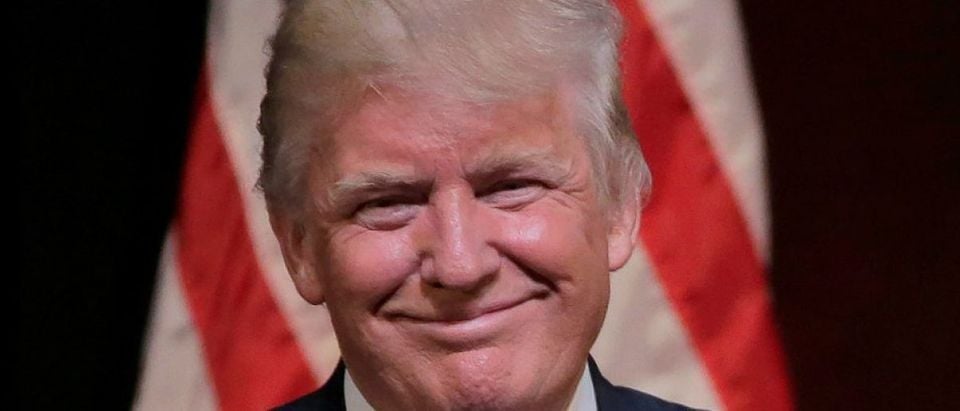Republican nominee Donald Trump is organizing supporters to observe balloting on election day to prevent voter fraud, prompting criticisms from Democratic lawyers and legal scholars who say the plan is a poorly disguised voter suppression effort.
At a rally Friday in Altoona, Penn., Trump expressed his belief that he would lose the state only if the Clinton campaign engaged in underhanded tactics. “The only way we can lose, in my opinion, I really mean this, Pennsylvania, is if cheating goes on. I really believe it,” he said, before urging police chiefs and his supporters to search for fraud and defend the integrity of the ballot box. “We’re going to watch Pennsylvania,” he continued. “Go down to certain areas and watch and study, make sure other people don’t come in and vote five times.” A form on the Trump campaign website allows supporters to sign up to assist in the effort. (VIDEO: Trump In Pennsylvania: Only Way I Lose Is ‘If Cheating Goes On’)
“It’s really extraordinary in 2016 that we are again dealing with these kinds of tactics,” Marc Elias, general counsel for Democratic nominee Hillary Clinton’s campaign, said. “I’ll leave it to the Republican party whether they think that this is an effective way for them to build a big tent coalition, but on the legal front it’s really disheartening and extraordinary.”
“To be clear, liberals love to throw out the voter intimidation card,” Trump campaign spokesman Jason Miller told NPR. “What we’re advocating are open, fair and honest elections. As we’ve seen from Crooked Hillary’s willingness to use – and outright lie about – government institutions for personal and political enrichment, there’s a lot of cheating going on.”
One of the country’s leading election law experts says Trump’s plan doesn’t pass legal muster, a charge the campaign vigorously denies.
Rick Hasen, professor at UC Irvine School of Law, points to a consent decree imposed on the Republican National Committee (RNC) in 1982 which forbids the sort of ballot-security activity Trump has proposed in recent days. A consent decree is a mechanism for resolving a dispute without admissions of guilt or liability. The 1982 decree was issued after reports of voter suppression in minority-majority voting precincts during the Nixon administration, and will expire on Dec. 1, 2017. Though the decree allows for the RNC and its agents to engage in normal, poll-watching activities, it forbids any ballot-security efforts.
Poll-watching is part of any successful “get out the vote” campaign, a process in which election observers affiliated with a party or campaign track voter turnout in real time at the precinct level. Observers relay data to a command center or party headquarters, which then uses the data to target voters who have not yet cast ballots. These activities are perfectly legal. Hasen argues that what Trump is proposing is specifically forbidden by the 1982 decree.
Section E of the decree requires that the RNC:
Refrain from undertaking any ballot security activities in polling places or election districts where the racial or ethnic composition of such districts is a factor in the decision to conduct, or the actual conduct of, such activities there and where a purpose or significant effect of such activities is to deter qualified voters from voting.
Though Trump at no point makes specific reference to such precincts, Hasen argues his repeated invocation of the term “certain areas” during his Friday address is an obvious reference to urban, majority-Democrat voting sites, which in the case of Pennsylvania (and other key battleground states) are largely composed of minority voters.
“It’s at least enough innuendo based on the other things that Trump has said in the campaign, that you could make the case that this would fall under Part E, that kind of intimidation aimed at or based on minority status or where they are in the state and who they are,” Hasen told The Washington Post.
The harder question in this case may be that of agency, Hasen says. The consent decree is binding on the RNC and its agents, but is not necessarily applicable to individual campaigns. Given the intimate coordination between the Trump campaign and the national committee, Hasen believes Democratic National Committee (DNC) lawyers have a strong case for arguing that the decree is enforceable against Trump.
“If I were the lawyer for the [Democratic National Committee], I would try to make the case that Trump is acting as an agent for the RNC and the RNC is acting as an agent of Trump since they have a joint fundraising committee and they are working together,” he said said. “I can’t tell you how a court would rule on this question, but I certainly think the Democrats could make that case.”
The form allowing supporters to sign on as election observers was not available on the Trump campaign website as of Monday morning.
Send tips to kevin@dailycallernewsfoundation.org.
All content created by the Daily Caller News Foundation, an independent and nonpartisan newswire service, is available without charge to any legitimate news publisher that can provide a large audience. All republished articles must include our logo, our reporter’s byline and their DCNF affiliation. For any questions about our guidelines or partnering with us, please contact licensing@dailycallernewsfoundation.org.


